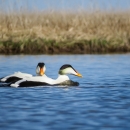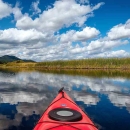Moose are thought to have colonized the Yukon-Kuskokwim drainages in the 1940s. Local subsistence hunters started using moose as an important subsistence food increasingly from that time forward. In recent years, salmon subsistence fishing has been regulated often with limited openers for Chinook salmon. Hunting for caribou from the Mulchatna caribou herd is closed for conservation purposes. With these limitations, moose hunting has become much more important for subsistence needs.
The Yukon Delta National Wildlife Refuge conducts both compositional and population moose surveys when conditions permit within the Yukon Delta National Wildlife Refuge and Unit 18. Weather and snow conditions, staff and pilot availability, and funding determine the success of moose surveys each year. There are currently 5 survey units within the refuge and as many as 3 survey units have been completed in one season. However, this is uncommon and surveying 1 or 2 units per year is typical with some years having no surveys completed. Units are surveyed every 3 years on a rotational basis. The data generated from moose surveys are used for regulatory changes for hunting and assessing the health of a population. The last time moose composition surveys were conducted within the Kuskokwim Tributaries (Zone 2) Survey Unit was in November 2020...See documents for complete survey reviews from 2020 and 2021.



